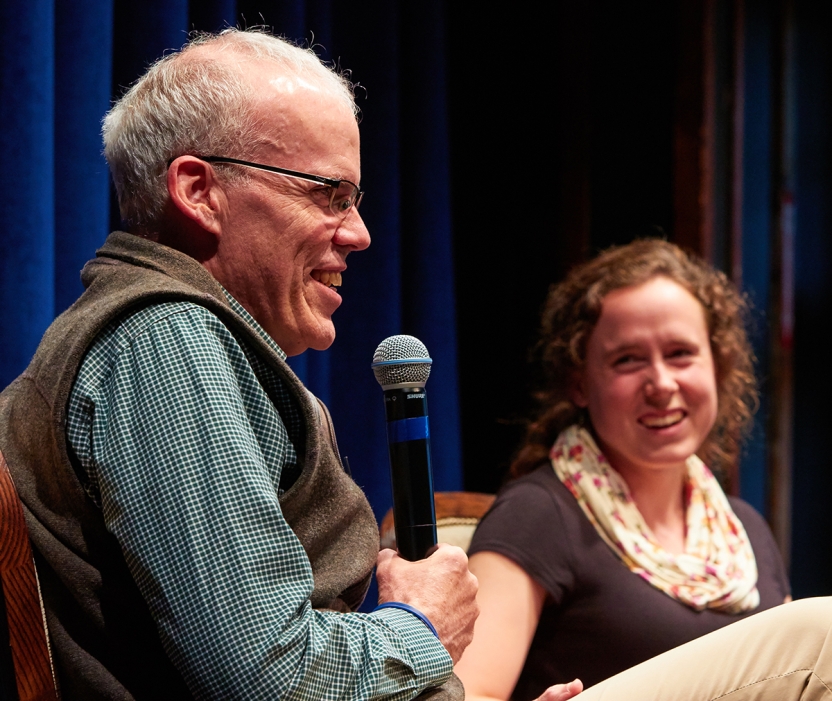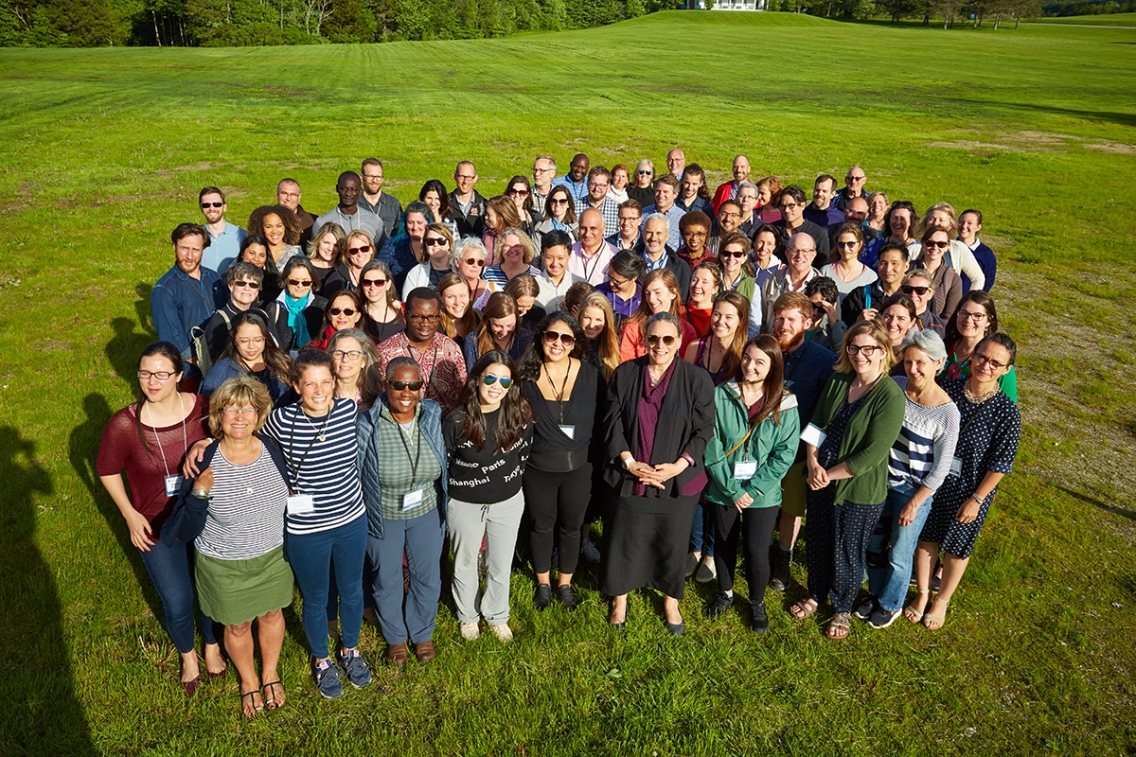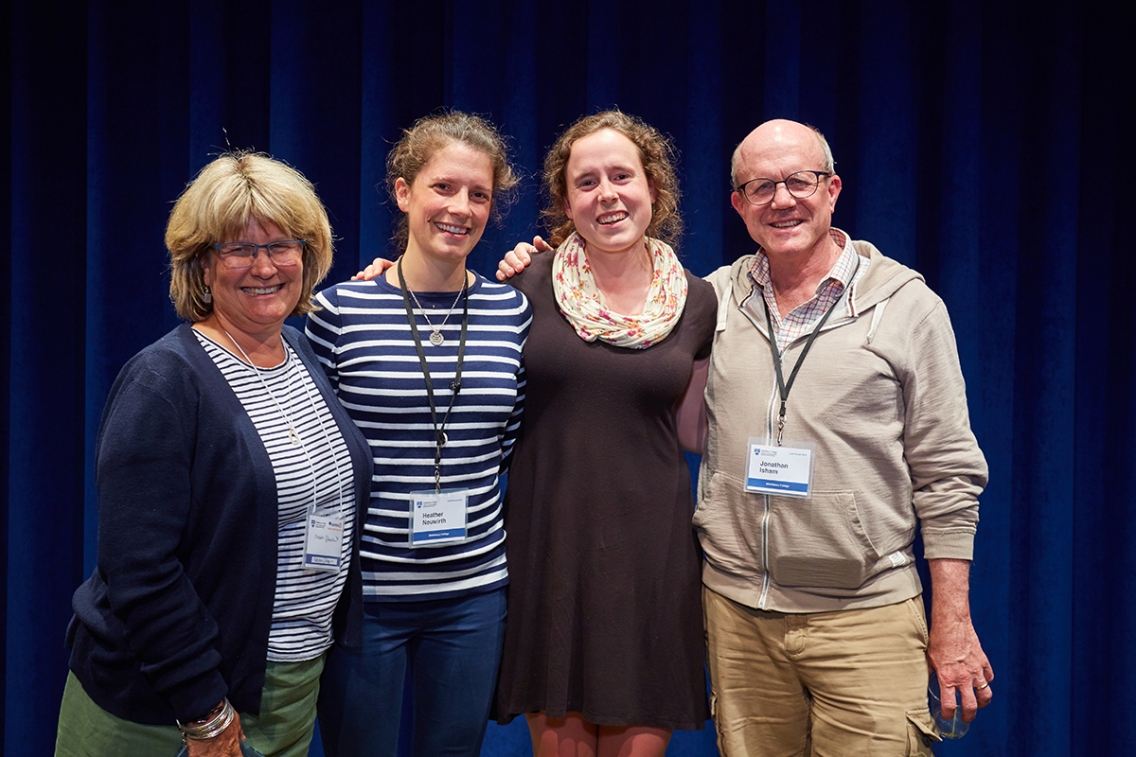June Forum Gathers Education Leaders to Discuss Social Impact

MIDDLEBURY, Vt. – Middlebury’s Center for Creativity, Innovation, and Social Entrepreneurship recognized Schumann Distinguished Scholar in Environmental Studies Bill McKibben with its annual Vision Award on June 11, heralding the writer for his deep activism and his long commitment to fostering student creativity, engagement, and meaningful work. McKibben’s award came during the center’s three-day June Forum, an annual gathering of faculty, staff, and professionals in the field of social impact education.
This year’s forum—the center’s eighth—was titled “The Art of Connecting across Social Impact Experiences.”
“Never underestimate the power to convene,” said Middlebury College president Laurie Patton, who attended the June Forum to honor McKibben with the Vision Award. She celebrated the conference as an opportunity to gather the best minds in work that “has the energy of idealism but not that weight of utopianism.”
“You guys learn how to live as visionaries and with imperfection at the same time, and that is an incredibly deep skill to learn,” said Patton.

This year’s June Forum and concurrent Ashoka U Change Leader Retreat attracted 110 participants from 48 schools, nine organizations, six countries, and 21 states.
In all, this year’s June Forum and concurrent Ashoka U Change Leader Retreat attracted 110 participants from 48 schools, nine organizations, six countries, and 21 states. Attendees included faculty and staff at institutes of higher education, foundation partners, and nonprofit practitioners—a true coming together of professionals in the field of social impact education. For three days the participants gathered at Bread Loaf to discuss ways to better equip students to make meaning from their experiences and integrate reflection and connection into their studies.
Middlebury College first hosted the June Forum in 2012, on the heels of establishing the Middlebury Center for Social Entrepreneurship. Social entrepreneurs act as the change agents for large-scale social problems, applying innovation to society’s most pressing problems.
Heather Neuwirth, the program director for the Center for Creativity, Innovation, and Social Entrepreneurship, says the College was able to accelerate its program because of the generous advice and experience of colleagues at other institutions. Early on, the center recognized the value in regular gatherings with professionals in the field to learn, reflect, and grow, and turned to the Bread Loaf campus as the picturesque setting for that gathering. In the years since, the forum has grown in size and inclusivity, swelling to include faculty, staff, and other educators working on student engagement and innovation in education across a wide variety of backgrounds and disciplines.
“We as colleagues across institutions have really been able to bolster each other,” said Neuwirth, “whether it’s moral support or actual tangible programming… . I always come away from those conversations feeling like the whole is greater than what we can accomplish as one institution.”
After accepting his Vision Award, McKibben was quick to admit that he didn’t set out to become a social entrepreneur. In a conversation facilitated by Social Entrepreneurship Fellow Emeritus Jeannie Bartlett ’15, McKibben said writers are almost by definition the opposite of social entrepreneurs, happier to spend their time at the keyboard than anywhere else.
And yet McKibben stumbled into activism after realizing books and lectures alone wouldn’t win the fight against climate change. His activism began with a five-day walk from the Robert Frost cabin in Ripton to Burlington, Vt.
“You may want to take the bowl back,” McKibben joked, referring to the engraved bowl that commemorated his award. “We didn’t know what we were doing.”

From left: Elizabeth Robinson, associate dean of the College for creativity, engagement, and careers; Heather Neuwirth, director of programs for the Center for Creativity, Innovation, and Social Entrepreneurship; Jeannie Bartlett ’15; Jonathan Isham, professor of economics and environmental studies, and former faculty director of the Center for Social Entrepreneurship.
That first long walk ended in what was, at that time, the largest ever gathering in response to climate change in the United States. Next came the grassroots climate change organization 350.org, which McKibben founded alongside seven undergraduates. A few years later, McKibben turned his attention to a divestment campaign targeting the fossil fuel industry, which has been called the largest anticorporate campaign in history.
McKibben was swift to acknowledge that “it’s not like we’re winning this fight.” In speaking to a gathered crowd of social impact educators, he stressed that addressing climate change is a crucial component of fixing all other societal problems. “If we can’t somehow very quickly come to terms with climate change, then every other thing we’re trying to do becomes almost impossible,” said McKibben.
Still, he finds space for optimism. McKibben pointed to what he called one of the great lessons of the 20th century, and a great hope for the 21st: the history of nonviolent social movements, a lesson in “how the small and many might take on the mighty and few.” It’s a process that aims beyond changing policies to instead changing the zeitgeist, McKibben said.
“I have extraordinary admiration for people, many of them in this room, who are naturals at [this work], who really get how to organize and how to motivate and how to bring people together and how to build things,” said McKibben. “It is the great work of our time.”
By Kathryn Flagg; Photos by Todd Balfour

